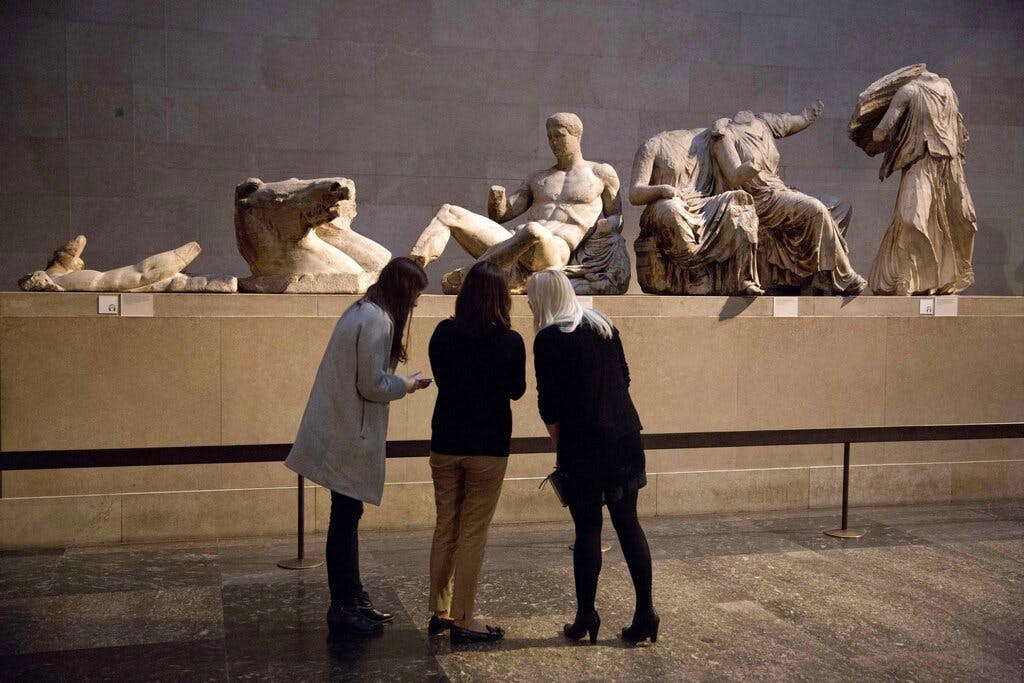Britain Is Right To Stand Its Ground on the Elgin Marbles
The culture minister warns that shipping the treasures back to Athens would open a ‘complete can of worms’ — as China eyes its own repatriations.

Laurels are due to Britain’s culture secretary, Michelle Donelan. That’s because of how she’s navigating the newest mania indulged by museum mandarins; the rush to give up treasures to secure historical mulligans. Chief among them: the Elgin marbles — sculptures that once adorned the Parthenon at Athens before being rescued from its ruins by Lord Elgin, who acquired them from the Ottomans and shipped them back to Blighty to be housed at the British Museum.
They’d be better off staying put, in our view, though the long-running drama is inching toward a denouement. The Times reports that the director of the British Museum, George Osborne, and Prime Minister Mitsotakis of Greece have — “in the seclusion of plush hotels and at the Greek ambassador’s townhouse” — been negotiating their return. The Greek paper Ta Nea reports the talks are “90 percent” done. Bloomberg News reckons a deal is close.
Enter the doughty Ms. Donelan, who warns the BBC that shipping the Elgin Marbles back to Athens would open a “complete can of worms” and “is a dangerous road to go down,” as it would lead to the exodus of much of the museum’s treasures. No doubt she has one eye on the Vatican’s return of items from the Parthenon and another on Germany’s return of the Benin Bronzes to Nigeria, both consummated last month.
The extraction of the Elgin marbles — first crafted in the fifth century before the common era by the legendary sculptor Phidias — remains legally ambiguous. Lord Elgin claimed that the Ottomans, then ruling Greece, gave him permission to remove them, a position endorsed by Parliament in 1816. He sold them to the British government that same year. Greece formally demanded them back in 1983, claiming they were looted.
The poet Lord Byron — “mad, bad, and dangerous to know” — versified his outrage. He mourned the Parthenon’s “mouldering shrines removed by British hand,” bewailed “this vacant, violated fane,” and thundered that “Curst be the hour when their isle they roved, And once again thy hapless bosom gored.” Byron gave his life at Missolonghi for Greek independence from the very Turks with whom Elgin did business.
We are with Ms. Donelan, who says of the treasure: “I don’t think it should be returned to Greece.” The fates of Palmyra in Syria and the Bamiyan Buddhas in Afghanistan illustrate that treasures are often least safe at their birthplace. It was the English who found Tutankhamun. Reducing works of art to their origin is as reductive as defining persons by their skin. They belong to what a former director of the British Museum calls the “memory of mankind.”
Imagine a world where Florence demands the “Mona Lisa” back: Leonardo da Vinci was her native son, after all, even if the painting was finished in France. Thomas Gainsborough’s “The Blue Boy” belongs to the Huntington Library, Art Museum, and Botanical Gardens at San Marino on the Coast, even though it was painted at London. If you’ve seen Rembrandt’s “Self-Portrait” at the Frick, you likely don’t want it back in Holland.
Though there are great museums, we favor Daniel Boorstin’s argument that works of art thrive best in private hands. Boorstin writes that “each living art object, taken out of its native habitat so we can conveniently gaze at it, is like an animal in a zoo. Something about it has died in the removal.” If artworks are forwarded on from the West, however, they will just arrive at museums less sure-handed in the business of managing and protecting great art.
In 2009, a Chinese team visited the Met looking for objects looted from Beijing’s Summer Palace, sacked in the Opium War by the son of the Elgin who saved Phidias’s sculptures from the Parthenon, which had been used as an ammo dump. In 2019, President Xi told the Greeks “we should work together” to reclaim the Elgin Marbles. Scholar Alexander Herman marks China’s assertiveness “in its quest to repair the loss caused during what it calls its ‘century of shame.’”
China has scored victories on this front, including the return of 32 artifacts from France in 2015. A pattern, too, has emerged of Chinese works being stolen from museums under suspicious circumstances, a trend that prompted GQ to wonder “strange how it keeps happening, how the greatest works of Chinese art keep getting brazenly stolen from museums around the world.” So it seems Ms. Donelan understands the game that is afoot.

